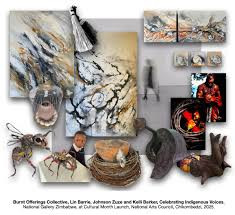
TALENTED dancer and actor Othnell “Mangoma” Moyo, says he was able to showcase Zimbabwe’s rich cultural history through performance during his recent tour of the United States and Canada.
The Music According to Percussion band leader staged performances in Boston, Massachusetts, Montreal, Cubec and at the Lincoln Center in New York City during the tour.
“Beginning of August this year, I took my solo act, Saungweme the Sound of the Bees to the Zimbabwean Music Festival in United States where I taught and performed at the Oregon State University in Corvallis, Oregon.
“I then performed in Eugene Oregon with fellow Zimbabwean musicians and then completed the mission with Boka Marimba in Portland, Oregon. I took the solo act to both New York and Missouri states in performance and lectures at the University of Rochester and University of Missouri,” he told NewsDay Life & Style as he shared his tour itinerary.
“I then went to Berlin to work on a continuation of the Matepe Mbira preservation project with Fabiano, a Germany/Brazilian electronics music artiste and we are working on a collaborative show that will premiere in January 2024 at HKW in Berlin.”
Mangoma believes the world is one and is united through drumming as it shares common experiences.
“Drums are used to communicate and send important messages in almost every culture I have been in contact with during my world tour. Drumming also symbolises power and strength in most of the cultures around the world,” he told NewsDay Life & Style.
“Drumming also brings the urge to dance. The lesson I have brought home is that we should be proud of our culture as it is the one that sets us apart from everyone. There are many valuable qualities in it that one cannot find anywhere else. It is the one that will give us a purpose and identity in this world when globalisation thrives.”
- Drumming unites the world: Mangoma
Keep Reading
Mangoma believes his world tours have instilled in him a much-deeper focus to build his Ngoma Ingungu Cultural Arts Centre in Domboshava which he predicts will be a leading institution in training and mentoring young indigenous musicians in Zimbabwe.
“The arts in other parts of the world helps in attracting a flow of tourists and foreign scholars who want to experience, learn or be part of a country’s beautiful music and dance culture. The arts are the most efficient and effective means to share values and bring people together for a common understanding,” he explained.
“I am currently building Ngoma Ingungu Cultural Arts Centre in pursuit of my interest in traditional sending home and reinstatement of lost and revered best practices.”
He keeps dreaming and has vowed to remain focused on becoming a legislator one day in his endeavour to play a pivotal role in the development of the country’s arts and cultural industry.
Speaking on his artistry, Mangoma said his music making was in five parts namely, family and communal, session work, performance with his band, solo performances and collaborations.
Reflecting on the past, he reckons that his biggest challenge is to be appreciated as an artiste by local communities.
On the contrary, Mangoma still believes that innovations based on one’s culture are better appreciated globally than an attempt to be a social entrepreneur on an idea which may have been transmitted with several falsehoods.
“I have faced discrimination from locals who demonise ancient artforms. I play indigenous instruments and sing traditional Zimbabwean mahon’era, kuGurudza, and ukuhlabela styles. They are appreciated more outside Zimbabwehence my frequent travels yet being uncelebrated back home because of reasons that date to the conditioning that locals got in the colonial era,” he said.








